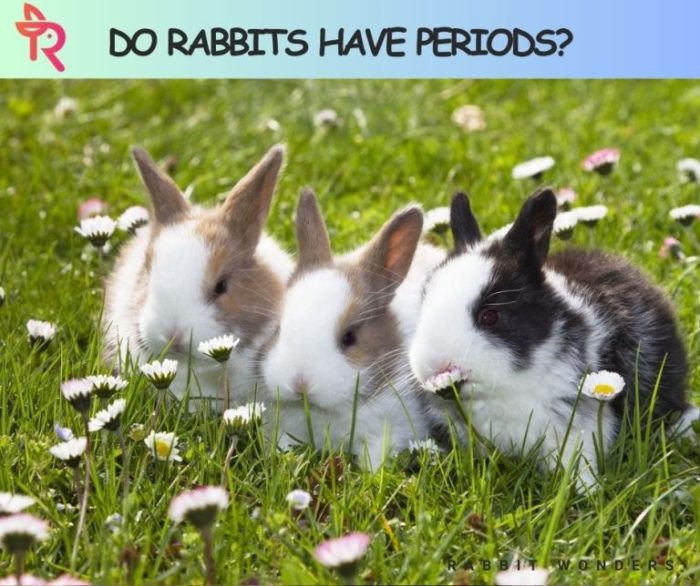The world of rabbits is filled with fascinating quirks and intriguing biological traits. One question that often sparks curiosity among rabbit owners and enthusiasts alike is whether these adorable creatures experience menstrual cycles like humans. In this article, we embark on a journey to unravel the reproductive mysteries of rabbits, exploring their unique reproductive system, estrus cycle, and the implications for their health and breeding practices.
Unlike humans, rabbits do not have menstrual periods in the traditional sense. Their reproductive system is markedly different, characterized by a unique estrus cycle that governs their reproductive behavior and fertility. Understanding this cycle is essential for responsible rabbit ownership, breeding, and overall well-being.
Breeding and Pregnancy in Rabbits

Rabbits are highly fertile animals with unique reproductive strategies and behaviors. Understanding their breeding and pregnancy cycles is crucial for proper rabbit care and management.
Mating Behavior
Rabbits are induced ovulators, meaning ovulation occurs only after mating. The male rabbit (buck) mounts the female rabbit (doe) from behind, gripping her fur with his teeth. Copulation typically lasts several seconds, and the doe may exhibit a characteristic “lordosis” posture with her head raised and back arched.
Estrus Cycle
The estrus cycle in rabbits is approximately 16-18 days. During estrus, the doe is receptive to mating and ovulation occurs within 10-12 hours after successful copulation. If mating does not occur, the doe will enter a period of diestrus, which lasts for 8-10 days.
Pregnancy
The gestation period in rabbits is relatively short, lasting around 31-32 days. The doe builds a nest of fur and hay within 1-2 days before giving birth. Litter size varies depending on the breed and age of the doe, but typically ranges from 4-12 kits.
Breeding Strategies
Rabbit breeders employ various breeding strategies to optimize litter size and quality. Controlled breeding involves pairing specific rabbits to achieve desired genetic traits. Group breeding allows multiple does to be bred with a single buck, increasing the chances of conception.
Artificial insemination is also practiced in some cases to introduce new genetics or improve reproductive efficiency.
Care During Pregnancy
Pregnant does require special care to ensure the health of both the mother and the litter. Proper nutrition, adequate space, and minimal stress are essential. The diet should be rich in protein, calcium, and fiber. Regular veterinary checkups are recommended to monitor the doe’s health and the progress of the pregnancy.
Health Implications of the Reproductive Cycle
The reproductive cycle in rabbits can have various health implications. Understanding these implications is crucial for ensuring the well-being of rabbits and preventing reproductive health issues.
Reproductive Disorders
Reproductive disorders in rabbits can range from hormonal imbalances to more serious conditions. Some common reproductive disorders include:
- Uterine Prolapse: A condition where the uterus protrudes through the vagina, often caused by hormonal imbalances or complications during pregnancy.
- Pyometra: An infection of the uterus that can occur in unspayed female rabbits, characterized by a pus-filled uterus.
- Pseudopregnancy: A condition where a female rabbit exhibits pregnancy-like symptoms despite not being pregnant.
Preventive Measures
Preventive measures can help minimize the risk of reproductive health issues in rabbits. These measures include:
- Spaying: Spaying female rabbits can eliminate the risk of uterine prolapse and pyometra.
- Neutering: Neutering male rabbits can reduce the risk of aggression and territorial behavior, which can contribute to reproductive issues.
- Regular Veterinary Checkups: Regular veterinary checkups can help detect and treat reproductive disorders early on.
Closure
In conclusion, the reproductive cycle of rabbits is a fascinating and intricate process that differs significantly from that of humans. Understanding the estrus cycle, breeding behavior, and potential health implications is crucial for providing optimal care and ensuring the well-being of our beloved rabbit companions.
Whether you’re a seasoned rabbit enthusiast or a curious observer, we hope this exploration has shed light on the unique reproductive mysteries of these captivating creatures.
Answers to Common Questions
Can rabbits get pregnant without a male present?
No, rabbits cannot get pregnant without the presence of a male. Mating is necessary for fertilization to occur.
How often do rabbits go into heat?
Rabbits typically go into heat every 10-14 days, with each heat period lasting around 4-5 days.
What are the signs that a rabbit is in heat?
Signs of heat in rabbits include restlessness, increased urination, a raised tail, and attempts to attract a male.
Can rabbits have false pregnancies?
Yes, rabbits can experience false pregnancies, which occur when they exhibit pregnancy-like symptoms without actually being pregnant.